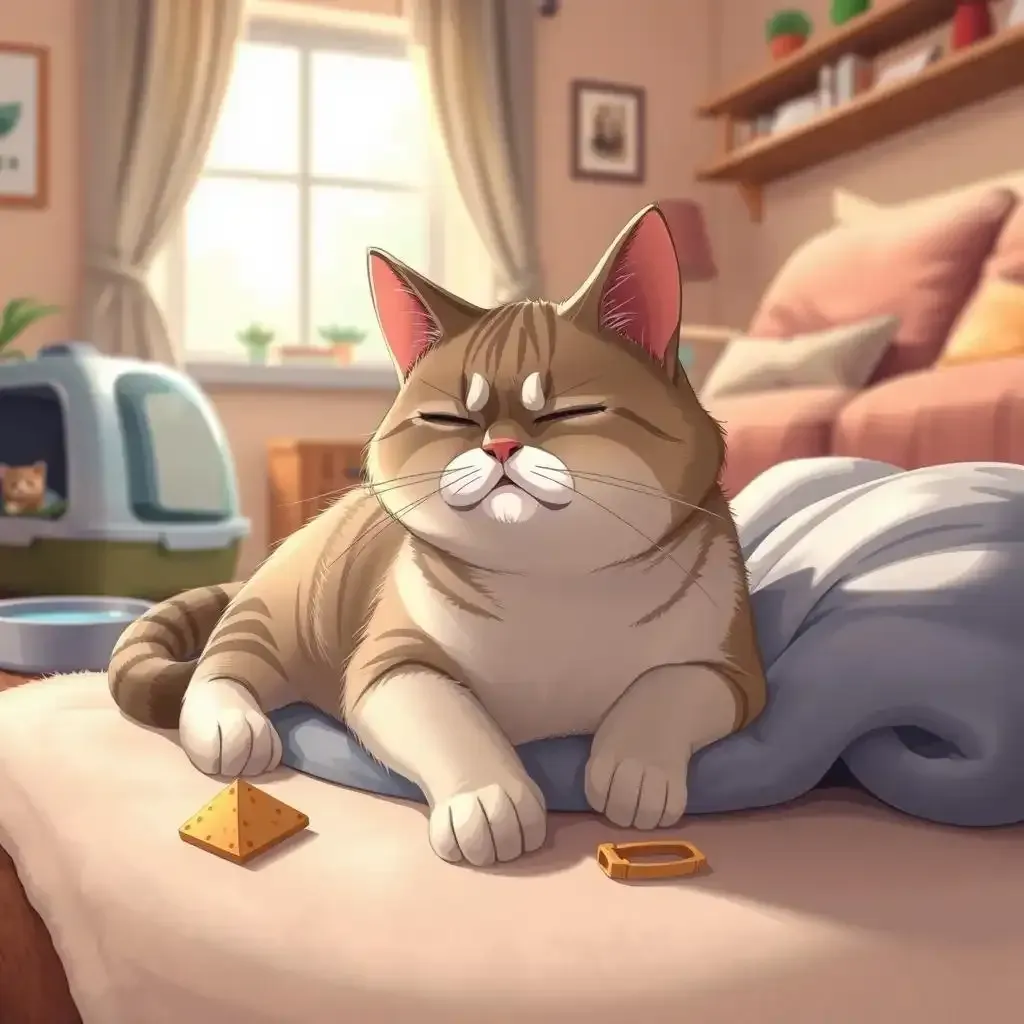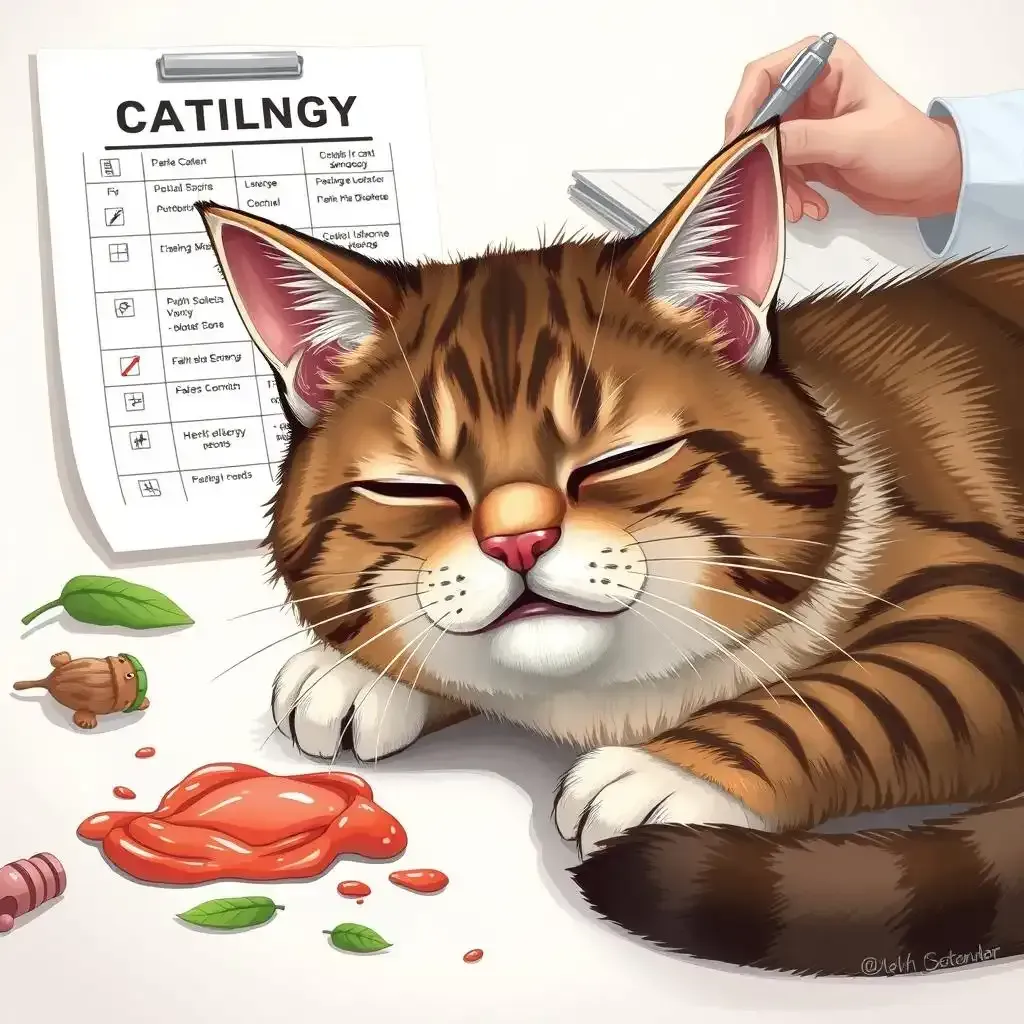Table of Contents
Ever noticed your furry friend sneezing after a catnip session? It might not be just playful excitement; some cats experience a true catnip allergy. While most cats adore catnip, a small percentage suffers adverse reactions. This article from kittentoyland.org will explore the world of catnip allergy, guiding you through understanding the symptoms, diagnosing the problem, and most importantly, learning how to manage it. We'll uncover what causes this reaction, how to identify it in your cat, and what steps you can take to ensure your beloved pet remains healthy and happy. Discovering a catnip allergy in your cat can be a surprise, but with the right knowledge, you can guide this issue with confidence. Let's explore in and learn everything you need to know about catnip allergy.
Understanding Catnip Allergy in Cats

Understanding Catnip Allergy In Cats
What is a Catnip Allergy?
Hey there, fellow cat lover! Let's talk catnip allergies. It's not exactly like a human allergy, where you sneeze and get itchy. For cats, a catnip allergy is more about their tummy and overall feeling than just a sniffle. It's all because of nepetalactone, the magical ingredient in catnip that makes most cats go bonkers. But for some unlucky felines, too much nepetalactone can cause a bit of a tummy upset. Think of it like eating too much of your favorite candy – initially delicious, but eventually it makes you feel a bit sick!
Imagine this: Your cat, usually a playful fluffball, suddenly starts acting strangely after a catnip party. They might get a bit droopy, vomit, or even have diarrhea. It's not a fun time for anyone, and it's definitely not the happy reaction we usually associate with catnip. It's important to remember that not all cats react this way; most cats are perfectly fine with catnip. But if you see these symptoms, it's time to take action. It's always best to err on the side of caution and consult your vet. You can also check out our post on catnip toy safety for additional information.
Symptom | Description |
|---|---|
Vomiting | Your cat throws up. |
Diarrhea | Your cat has loose or watery stools. |
Lethargy | Your cat seems unusually tired or sluggish. |
Diagnosing a Catnip Allergy
So, how do you know if your cat's tummy troubles are because of catnip? Well, it's a bit like being a detective! First, pay close attention to when your cat shows symptoms. Did it happen right after they enjoyed some catnip? If so, that's a big clue. Keep a careful record of when your cat was exposed to catnip and when they got sick. This detailed log will be super helpful for your vet.
Next, you'll need to visit your vet. They'll ask about your cat's symptoms, their history with catnip, and other details. They might even run some tests to rule out other possibilities. Think of it as a collaborative effort – you're the catnip investigator, and the vet's the expert. Working together, you'll get to the bottom of your cat's tummy troubles. If you're looking for more on cat care check out our article on local toy safety.
- Keep a detailed catnip exposure and symptom diary.
- Consult your veterinarian for a proper diagnosis.
- Discuss potential alternative toys or treats.
Symptoms and Diagnosis of Catnip Allergy

Symptoms And Diagnosis Of Catnip Allergy
Okay, so your cat's been acting weird after a catnip party? It's not always rainbows and zoomies, sadly. Sometimes, that nepetalactone – the stuff that makes cats go wild – can cause a bit of a problem. Think of it like this: you love pizza, right? But if you ate ten whole pizzas in one sitting, you'd probably feel pretty awful! That's kind of what happens to some cats with catnip.
Symptoms can vary, but common signs of a catnip allergy include vomiting (sorry, that's not fun!), diarrhea (even less fun!), and lethargy – meaning your usually bouncy cat is suddenly super sleepy. They might also seem a bit off, not their usual playful selves. It's important to remember that these symptoms aren't always caused by catnip, so don't panic just yet! There are other reasons why your cat might be feeling under the weather, so it's always best to check with your vet. For more on keeping your kitty happy, you might find our guide on helpful.
Symptom | What it looks like |
|---|---|
Vomiting | Your cat throws up. Not pretty, but a common sign. |
Diarrhea | Uh oh, runny poops! Another classic symptom. |
Lethargy | Your usually energetic cat is suddenly super sleepy and sluggish. |
Diagnosing a catnip allergy isn't always easy. It's a bit like a detective story! First, you need to be a super observant cat parent. Keep a careful diary of when your cat eats catnip and when they start showing symptoms. This will help your vet figure out what's going on. If you suspect a catnip allergy, it's super important to visit your veterinarian. They can perform tests to rule out other illnesses and confirm if it's indeed a catnip allergy. For more on cat care, check out our article on .
Remember, your vet is your best friend when it comes to your cat's health. They'll be able to give you the best advice and treatment plan. Don't hesitate to ask questions – no question is too silly when it comes to your furry friend's well-being! Maybe you'll find some helpful tips in our post about toys for cats.
- Keep a detailed diary of catnip exposure and symptoms.
- Visit your vet for a proper diagnosis.
- Follow your vet's advice carefully.
Managing Catnip Allergy: Prevention and Treatment
So, your cat's got a catnip allergy? Don't panic! It's totally manageable. Think of it like having a food allergy – you just gotta avoid the problem food. In this case, the problem food is catnip. The first step is simple: no more catnip! Yep, that's right – ditch the catnip toys and treats. It might seem harsh, but it's the best way to keep your kitty healthy and happy. If you're looking for fun alternatives, check out our guide to .
But what if your cat accidentally gets into some catnip? Well, that's where careful observation comes in. Keep a close eye on your cat after any potential catnip exposure. If you notice any symptoms like vomiting, diarrhea, or lethargy, get in touch with your vet immediately. They're the experts, and they'll be able to give you the best advice. For more information on keeping your cat safe, check out our article on toy safety tips.
Step | Action |
|---|---|
1 | Remove all catnip from your home. |
2 | Monitor your cat closely after potential exposure. |
3 | Consult your veterinarian for diagnosis and treatment. |
Your vet might suggest some medication to help manage the symptoms if your cat does have a reaction. They might also recommend some alternative treats or toys that don't contain catnip. Remember, this isn't the end of the world – plenty of awesome cat toys out there don't involve catnip! For example, you could try a fun new interactive toy; read our review of interactive cat toys for ideas.
Prevention is key, my friend! Keep your catnip securely stored away, out of reach of your curious kitty. If you have multiple cats, make sure only the catnip-loving ones have access to it (and keep a close eye on them too!). It's all about creating a safe and healthy environment for your feline friend. If you're interested in learning more about creating a safe environment for your pet, check out our guide to .
- Safe storage of catnip is crucial.
- Supervise your cat during playtime.
- Choose catnip-free alternatives.
Dealing with a catnip allergy can feel overwhelming, but remember you're not alone. Many cat owners face this, and with a little care and attention, you can keep your cat healthy and happy. It's all about understanding your cat's needs and working with your veterinarian to find the best approach. For more advice on cat care, you can check out our blog on toys for kittens.
And hey, even without catnip, your cat can still have a blast! There are tons of other amazing toys and activities that will keep them entertained and engaged. Think puzzle feeders, feather wands, or even a good old-fashioned game of chase! Remember – a happy cat is a healthy cat, catnip or not. We've got a great selection of toys to choose from at kittentoyland.org!
Alternative Toy | Benefits |
|---|---|
Puzzle Feeders | Mental stimulation and slow feeding. |
Feather Wands | Encourages hunting instincts. |
Interactive Toys | Keeps cats entertained for hours. |
Final Thought
While a catnip allergy might seem like a minor inconvenience, understanding its causes, symptoms, and management is crucial for responsible cat ownership. Remember, early detection and a collaborative approach with your veterinarian are key to ensuring your cat's well-being. By following the advice outlined in this article and maintaining open communication with your vet, you can help your feline companion live a long, happy, and catnip-free (or at least, carefully managed catnip-inclusive) life. Visit kittentoyland.org for more helpful tips and resources on cat health and happiness.